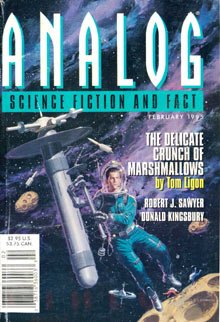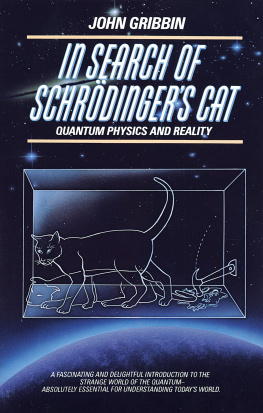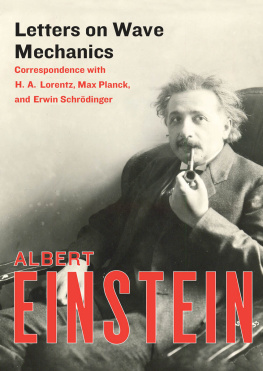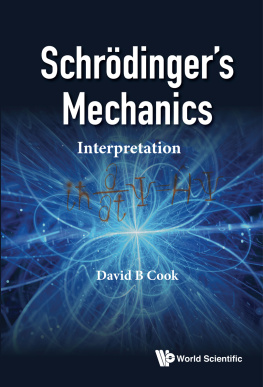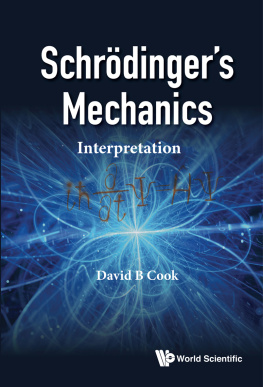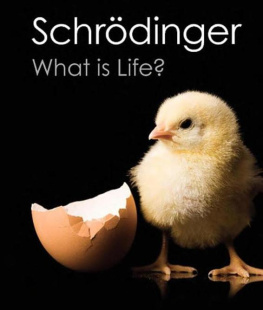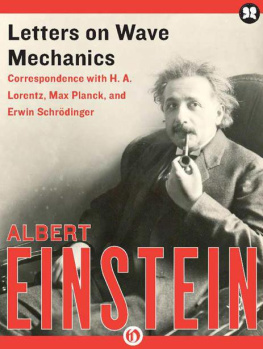Schrdinger
life and thought
Erwin Schrdinger was a brilliant and charming Austrian, a great scientist, and a man with a passionate interest in people and ideas. In this, the first comprehensive biography of Schrdinger, Walter Moore draws upon recollections of Schrdingers friends, family and colleagues, and on contemporary records, letters and diaries.
Schrdingers life is portrayed against the background of Europe at a time of change and unrest. His best known scientific work was the discovery of wave mechanics, for which he was awarded the Nobel prize in 1933. However, Erwin was also an enthusiastic explorer of the ideas of Hindu mysticism, and in the mountains of his beloved Tirol he sought a philosophic unity of Mind and Nature. Although not Jewish, he left his prestigious position at Berlin University as soon as the Nazis seized power. After a short time in Oxford he moved to Graz, but barely escaped from Austria after the Anschluss. He then helped Eamon de Valera establish an Institute for Advanced Studies in Dublin. It was here that he spent the happiest years of his life, and also where he wrote his most famous and influential book What is Life?, which attracted some of the brightest minds of his generation into molecular biology. Schrdinger enjoyed a close friendship with Einstein, and the two maintained a prolific correspondence all their lives.
Schrdinger led a very intense life, both in his scientific research and in his personal life. Walter Moore has written a highly readable biography of this fascinating and complex man, which will appeal not only to scientists but to anyone interested in the history of our times, and in the life and thought of one of the great men of twentieth-century science.

A portrait by Lotte Meitner-Graf, made in London (c. 1935).
Schrdinger
life and thought
Walter Moore

CAMBRIDGE UNIVERSITY PRESS
Cambridge, New York, Melbourne, Madrid, Cape Town, Singapore,
So Paulo, Delhi, Dubai, Tokyo, Mexico City
Cambridge University Press
The Edinburgh Building, Cambridge CB2 8RU, UK
Published in the United States of America by
Cambridge University Press, New York
www.cambridge.org
Information on this title: www.cambridge.org/9781107569911
Walter John Moore 1989, 2015
Tis publication is in copyright. Subject to statutory exception and to the provisions of relevant collective licensing agreements, no reproduction of any part may take place without the written permission of Cambridge University Press.
First published 1989
Reprinted 1990
First paperback edition 1992
Reprinted 1993, 1994, 1998
Canto Classics edition 2015
Printed in the United Kingdom by Clays, St Ives plc
A catalogue record for this publication is available from the British Library
ISBN 9781107569911 Paperback
Cambridge University Press has no responsibility for the persistence or accuracy of URLs for external or third-party internet websites referred to in this publication, and does not guarantee that any content on such websites is, or will remain, accurate or appropriate. Information regarding prices, travel timetables, and other factual information given in this work is correct at the time of first printing but Cambridge University Press does not guarantee the accuracy of such information thereafter.
Contents
Preface
In this book I have tried to tell something of the life of Erwin Schrdinger in such a way that even those who are not scientists may be able to understand the greatness of his work, the range of his ideas, and the kind of person he was. Montaigne wrote that our life is divided betwixt folly and prudence: whoever will write of it only what is reverend and canonical will leave about the one-half behind. In order to come closer to the whole of Schrdinger, I have included some account of his personal life. It is not thirty years since his death and thus many personal memories and sensitivities have not yet receded into history, a situation that is both a help and a hindrance for a biographer. It is possible to interview former friends and colleagues, but some important collections of letters and memoirs remain closed to research.
My book was made possible by the generosity with which Schrdingers eldest daughter, Mrs Ruth Braunizer, made available many of the archives concerning her fathers life.
Special thanks are due to Professor Ludvik Bass of the University of Queensland, Schrdingers last postdoctoral student, who reviewed the entire manuscript; his scientific and historical comments have been invaluable.
Dr Linda Wessels of Indiana University provided many helpful suggestions. Professor James McConnell of the Dublin Institute for Advanced Studies never failed to answer my seemingly endless questions about Schrdingers Dublin years. Dr Anthony Bracken reviewed several theoretical sections; Professor David MacAdam clarified some of the difficulties of color theory. My friend and neighbor, Robert Halporn, assisted in the decipherment of Gothic script and in explaining life in Vienna and the Austrian educational system. Dr John Fletcher helped with the study of Schrdingers poetry. Professor Sture Nordholm provided translations of the Nobel Archives, and Dr Kirsten Streib translated some of Niels Bohrs letters from the Danish. Professor Karl v. Meyenn of Barcelona made available unpublished material about Schrdinger in Spain, and Professor Kenji Sugimoto shared his collection of photographs. My family was enlisted in various ways: Professor Joseph Wiecha as consultant on German language and literature, my sister Mary Wiecha for comments on style and content, and my nephew Dr John Wiecha for one of the interviews.
So many others provided help with interviews and research material that I can only mention their names and the relevant section, even omitting their often distinguished titles.
Dublin. Charles Acton, Ronald Anderson, Otto Bergmann, Hermann Bruck, Basil Clancy, Ernesto Corinaldesi, Brigid Dolan, Eithne Dunne, Nuala Feric, Stephen Feric, Gerald Gardner, Herbert Green, Jim Hamilton, Vincent Hart, Margaret Holmes, Fred Hoyle, Ray Kavanagh, John Lewis, Alexander Lieven, AJ. McConnell, William McCrea, Lena McManus, Ernan McMullin, Des McNamara, Harry Messel, Lillian Murnane, Maire Cruise OBrien, Sean OCinneide, H.W. Peng, Jim Pounder, John Ryan, Brendan Scaife, Alfred Schulhof, Neville Symonds, John Synge, Louis Werner, Nicole Whitney, Evelyn Wills.
Austria. Maria Bertel, Bruno Bertotti, Johanna Bianchi, Arnulf Braunizer, Manfred Breitenecker, Ferdinand Cap, Erika Cremer, Auguste Dick, Dieter Flamm, Wilhelm Frank, Leopold Halpern, Otto Hittmair, Berta Karlik, Wolfgang Kerber, Ernst Kohlrausch, Emmy Krafack, Kurt Mhlberber, Hermann Mark, Rena Mayer-Rieckh, Suzanne Nemenz, Heinz Oberhammer, Gerhard Oberkaufler, Heinz Pelzer, Kurt Polzer, Mario Rella, Roman Sexl, Ulrike Smola, Walter Thirring, John Ullmann, Paul Urban.
Britain. D.J. Allen, Hansi Bauer-Bhm, Gustav Born, Duncan Davies, Margit Dirac, Patrick Dolan, Margaret Farley-Born, Charles Frank, Fanchon Frhlich, Herbert Frhlich, David ter Haar, Barry Hickman, Paul Hoch, Patrick Johnson, Nicholas Kemmer, Heinrich Kuhn, Nicholas Kurti, Catherine Macmillan, Penelope Hughes Minney, Karl Popper, Lucie Rie, N.H. Robinson, Robin Schlapp, Charlotte Simon, Geoffrey Stephenson, Leslie Sutton.
Germany. Ella Ewald, Armin Hermann, Dieter Hoffmann, Dieter Hummel, Theodor Laue, Walter Ledermann, Erika Regener, Fritz Schweighofer, Viktor Weisskopf, K. Wiecke, Eugene Wigner.
Next page

